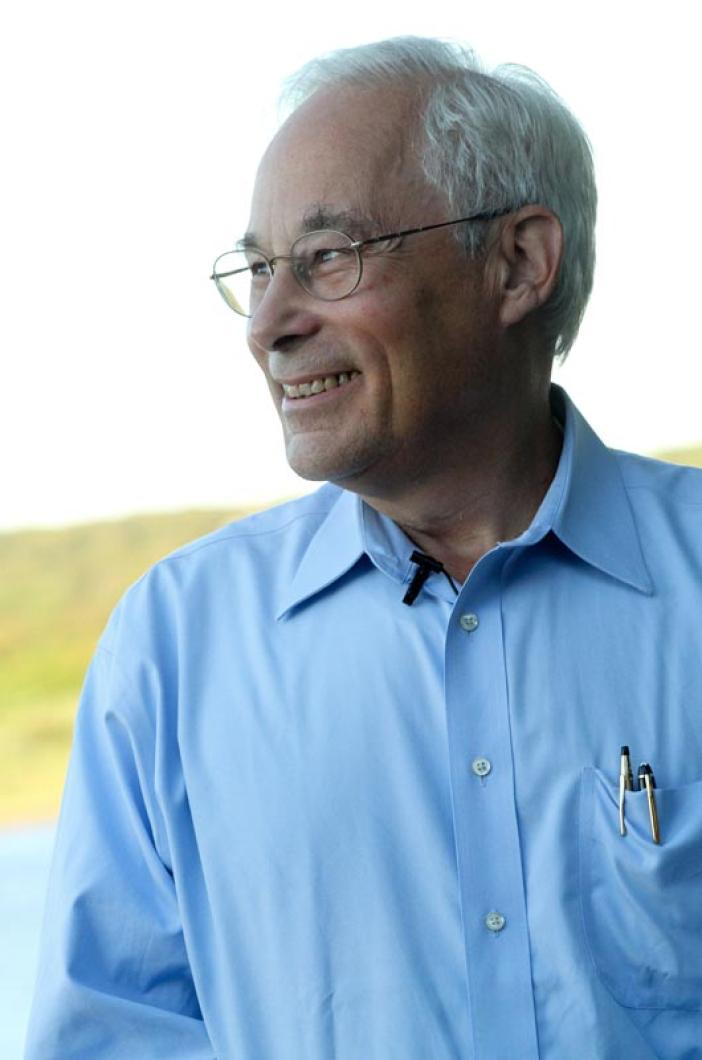More than 30 years ago Dr. Donald Berwick began seeing patients in the Martha’s Vineyard Hospital emergency room. At the time, the ER was staffed by visiting physicians on weekends, so he helped set up the schedule and find the doctors a place to stay for the night. Since then, he has stopped seeing patients, was temporarily appointed by President Obama as administrator of the Centers for Medicare and Medicaid Services in Washington, D.C., and in June, declared his campaign for governor of Massachusetts.
But he still makes the time to spend in Menemsha each summer, and last Sunday evening he spoke to a group of prospective supporters of the Schwartz Center for Compassionate Healthcare. The event drew summer and permanent residents and visitors to the home of Michael and Audrey Straight in Chilmark, where they listened to Dr. Berwick’s views on health care, and the ways his goals for health care align with the Schwartz Center. Many who attended were health care professionals.
Center executive director Julie Rosen announced to the crowd that Dr. Berwick, who is something of an evangelist for a patient-centered health care system, is her idol.
In remarks, Dr. Berwick spoke of abolishing visiting hours, so that friends and family could visit their loved ones at any time.
“I don’t think that it makes sense, that a husband and wife of 30 years, living together, working together, raising kids together, worshipping together, when you come to the hospital, suddenly you lose that right to be together,” he told the audience, about a third of which identified themselves as professionals in the health care field.
He spoke also of facilitating better communication among community health care professionals assigned to a particular case, and the crucial role he believes the patient serves in linking those caretakers.
Part of the Schwartz Center’s work is a program called Rounds, in which a staff member facilitates discussion among health care professionals about certain problematic cases. It is part of their mission to teach compassion to medical professionals.
Rounds provides providers the “ability to sit down and reflect on just how we are being perceived by our patients,” said Joren Madsen, who directs the transplant center at Massachusetts General Hospital and has participated in the program. “It is something that we need to be reminded of . . . you might think [compassion] is something you are born with or not, but it’s not; it’s something you can learn,” he said.
After Dr. Berwick spoke, Amy Houghton, director of business operations at the Vineyard Nursing Association, and Sarah Kuh, who directs the Vineyard Health Care Access Program, discussed how to take his ideas and put them to use on the Island. “For the VNA, obviously the work we do is by extension, patient-centered, that is how we operate, so I think the next step is how we engage with the other health professionals that touch that patient’s life,” Ms. Houghton said.
Shortfalls in the delivery of patient-centered care on the Island is not the fault of any one institution or provider, but rather a broader systemic issue that pays providers per patient visit or medical test, said Ms. Kuh.
“[It’s an issue of] providers not being able to spend a lot of time and patience because of the way insurance is paid,” she said.
The Vineyard has been a beneficiary of the Rounds program.
Sally Okun, a nurse based on Cape Cod, began facilitating Rounds at the Martha’s Vineyard Hospital six or seven years ago. “It was amazing because even though it was a small 15-bed hospital at the time, the kinds of controversies that would come up at Massachusetts General Hospital would come up here,” she said. Sponsored by the ethics board at the hospital, Rounds take place about four times in the off-season.
“It’s an environment where people can safely talk about how challenging and hard that is,” Ms. Okun said.
As someone with firsthand knowledge of the Island, Dr. Berwick sees the Vineyard as a perfect site for a community-based, patient-centered health care system. “I think that possibility is there,” he said. “I have always been intrigued about the Island, in the basic sense that there is a year-round population, and I think we have a chance on Martha’s Vineyard to create a world-class community-based system that would be helpful to the country as a model.”
But the amendments which Dr. Berwick believes the health care system needs do not come without a struggle. Even when it comes to something as simple sounding as visiting hours.
“Change is hard,” he said. “They are worried about germs and liability, they are worried that there will be noise and conflict . . . you have to leap over your own assumptions, your habits,” he said, in order to try a new system.
Dr. Berwick announced his gubernatorial run in mid-June. His last comment to the audience may be a clue to his education policy, should he be elected in November 2014.
“When the people served are placed at the center, when they have control and authority, when the students and parents have control and authority . . . things get right,” he said.







Comments
Comment policy »